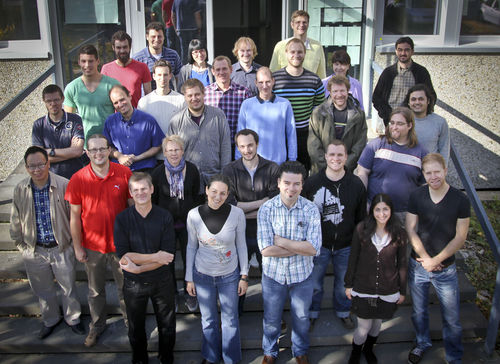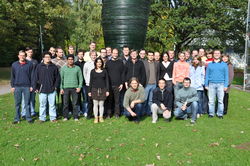Difference between revisions of "Main Page"
Jump to navigation
Jump to search

| (11 intermediate revisions by 3 users not shown) | |||
| Line 4: | Line 4: | ||
</p> | </p> | ||
| − | <p style="padding: 20px 20px 0 20px;">We use high-performance computing on supercomputers and parallel clusters to solve complex problems in physics that would otherwise be impossible to solve via analytical methods. Our main [[research]] areas are presently to understand the physics of '''soft matter systems''' in general, with a particular emphasis on charged systems like polyelectrolytes, charged colloids, ferrofluids and ionic liquids. In addition we are interested in various biophysical problems. The simulations are performed on parallel computers with help of the simulation package '''{{ES}}''', and we continue to develop algorithms for long range interactions. | + | <p style="padding: 20px 20px 0 20px;">We use high-performance computing on supercomputers and parallel clusters to solve complex problems in physics that would otherwise be impossible to solve via analytical methods. Our main [[research]] areas are presently to understand the physics of '''soft matter systems''' in general, with a particular emphasis on charged systems like polyelectrolytes, charged colloids, ferrofluids and ionic liquids. In addition we are interested in various biophysical problems. The simulations are performed on parallel computers with help of the simulation package '''{{ES}}''', and we continue to develop algorithms for long range interactions. |
| − | |||
| − | |||
| − | |||
| − | |||
| − | |||
| − | |||
| − | |||
| − | |||
| − | |||
| − | |||
| − | |||
| − | |||
| − | |||
== News == | == News == | ||
| Line 27: | Line 14: | ||
|- | |- | ||
|<div style="border:thin solid black; background-color:#B1CED7; padding:10px; margin-left:auto; margin-right:auto; width:20em;">[[Christian Holm|Prof. Dr. Christian Holm (Director)]]<br /> | |<div style="border:thin solid black; background-color:#B1CED7; padding:10px; margin-left:auto; margin-right:auto; width:20em;">[[Christian Holm|Prof. Dr. Christian Holm (Director)]]<br /> | ||
| − | [http://www.icp.uni-stuttgart.de/~hilfer Rudolf Hilfer] | + | [http://www.icp.uni-stuttgart.de/~weeber Rudolf Weeber]<br /> |
| + | [http://www.icp.uni-stuttgart.de/~schlaich Alexander Schlaich]<br /> | ||
| + | [http://www.icp.uni-stuttgart.de/~hilfer Rudolf Hilfer]<br /> | ||
| − | + | Office:[[Simone Blümlein]]<br />[mailto:secretary@icp.uni-stuttgart.de secretary@icp.uni-stuttgart.de]<br /> | |
Phone: 49-(0)711/685-63593<br />Fax: 49-(0)711/685-63658 </div> | Phone: 49-(0)711/685-63593<br />Fax: 49-(0)711/685-63658 </div> | ||
|<div style="border:thin solid black; background-color:#B1CED7; padding:10px; margin-left:auto; margin-right:auto; width:20em;">Institute for Computational Physics<br/>Universität Stuttgart<br/>Allmandring 3<br/>70569 Stuttgart<br/>Germany<br/><br/>[[How to find us]]?</div> | |<div style="border:thin solid black; background-color:#B1CED7; padding:10px; margin-left:auto; margin-right:auto; width:20em;">Institute for Computational Physics<br/>Universität Stuttgart<br/>Allmandring 3<br/>70569 Stuttgart<br/>Germany<br/><br/>[[How to find us]]?</div> | ||
|} | |} | ||
{| style="width:100%;align=center;" | {| style="width:100%;align=center;" | ||
| − | |<div style="border:thin solid black; background-color:#B1CED7; padding:10px; margin-left:auto; margin-right:auto; width:89.2%;">Professor Holm's Office Hours: Monday, 13:15 - 14:00<br/>Professor Hilfer Sprechstunde: Mittwoch 11:30 - 12:15<br/> | + | |<div style="border:thin solid black; background-color:#B1CED7; padding:10px; margin-left:auto; margin-right:auto; width:89.2%;">Professor Holm's Office Hours: Monday, 13:15 - 14:00<br/>Professor Hilfer Sprechstunde: Mittwoch 11:30 - 12:15<br/> |
| + | </div> | ||
|} | |} | ||
Latest revision as of 16:23, 1 June 2023
Welcome to the home page of the

We use high-performance computing on supercomputers and parallel clusters to solve complex problems in physics that would otherwise be impossible to solve via analytical methods. Our main research areas are presently to understand the physics of soft matter systems in general, with a particular emphasis on charged systems like polyelectrolytes, charged colloids, ferrofluids and ionic liquids. In addition we are interested in various biophysical problems. The simulations are performed on parallel computers with help of the simulation package ESPResSo, and we continue to develop algorithms for long range interactions.
News
Contact
Prof. Dr. Christian Holm (Director)
Rudolf Weeber Office:Simone Blümlein Fax: 49-(0)711/685-63658 |
Institute for Computational Physics
Universität Stuttgart Allmandring 3 70569 Stuttgart Germany How to find us? |
Professor Holm's Office Hours: Monday, 13:15 - 14:00
Professor Hilfer Sprechstunde: Mittwoch 11:30 - 12:15 |


